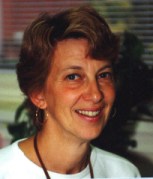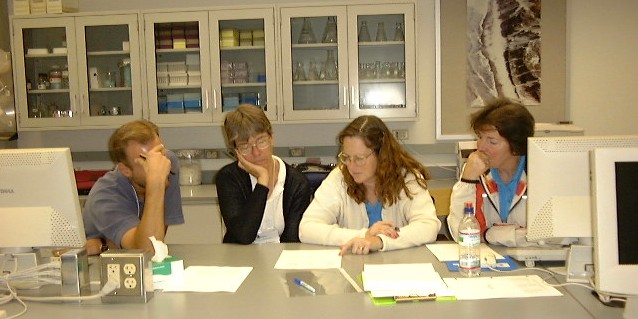Current President's Report
Maggie Haag
The events of September 11th have given me great reason to pause and reflect on the things that are important in my life. The first three things that came to mind were family, friends and personal freedom. Having reasonably good health and feeling safe were all important but they were also integral parts of the first three. While having great food, a nice house, a nice car or other material things may have hit this list at one point in my life, they arenít nearly as important as the first three. Ironically many of the reasons for the feelings of hatred toward America/Western world are based on the material aspects of our lives (and related foreign policies to protect them) and not on the fundamental values that we hold dear. I dare say that we would all fiercely fight for our family, friends and freedom before we would fight for a new house, car or other material goods. I hope from all this sadness and feeling of loss that we will grow as a more compassionate and understanding (worldly) society, regardless of our faith, country of origin or political beliefs.
The importance of ABLE to me personally, and I suspect to many of us, is also something that I greatly value. ABLE has provided me with the support of my profession in the context of friendship and sharing. We do not come together each year to have our egos massaged but rather to learn from each other and to help us educate our respective students. The value of ABLE is sharing and we really have developed a wonderful role model of what education, at all levels, should be about. ABLE is definitely on my list of things that I value about my life.

Maggie Haag, current President
University of Chicago, ABLE 2001
Roz Potter and all her support personnel at the University of Chicago should be thanked and commended for hosting a very successful ABLE 2001. The facilities were fabulous, the food was superb and the hospitality of the entire campus was much appreciated, especially from Dr. Jose Quintans and Lora Evans. There were 24 major workshops presented including one by Leonard Pysh (The Power of Genetics) which was a lab developed through ABLEís Laboratory Initiative Grant program. Seventeen mini workshops were offered Friday afternoon, providing participants with a wide range of activities and disciplines. The popularity of the mini-workshops continues to grow, with many feeling that this format is valued as much as the major workshops. The workshop on Freshwater Sponges as Indicators of Water Pollution by Malcolm Hill was another lab developed through the funding of the Laboratory Initiative Grant program.
Thanks again to our hosts and a special thanks to all the presenters. ABLE is really about the people who have taken the time to come to these annual meetings ready, willing and able to share their ideas and experiences.

Focus for the future
As we near the 25th anniversary of ABLE (at UNLV, June 2003), we must recognize the need to preserve the attributes of this organization for future educators of biology laboratory education. We need to encourage new participants for major and mini workshops at the annual meetings. We also need to enlarge the membership base for the organization. The trend is for new members to come on stream for the year that they are able to present/attend or for the year where the conference is offered at a near by institution. This is the reality of our economic times. It also means that our long-term membership base is of a moderate size but a good proportion of the membership are folks that are in for the short term. For our continued success in the future, we will need to rejuvenate the ranks (my apologies to my fellow greybacks) with more long-term members as well as new ideas.
I would ask you to consider making a personal invitation to join ABLE to colleagues at your institution and in your surrounding communities. As well, encourage graduate students, post-docs and young faculty to attend the annual conference. Use the avenue of the Waiver of Registration scholarships to encourage new individuals to attend. The commitment of ABLE (and these waivers) can be useful as a leverage with Chairs and Deans to provide additional support for graduate students, post-docs or young faculty to attend. If we each brought one new member on board, think of the diversity and talents that we might bring to the organization.
I would also ask you to consider making a personal invitation to have colleagues and new staff be presenters (major and mini) at the annual conference. It is important for us all to get exposure to new and innovative ways of presenting our laboratories. The input of these new ideas and the excitement of the science can often be best found in those who have recently graduated (MSc, PhD). If we can combine the energy and excitement of the science with the experience of greater membership, we will have a dynamite mix for the future. Information for presenters for both major workshops and mini workshop is available on the website. The deadline for a submission for a major workshop is November 15th while the deadline for a mini workshop is January 25th.

If you have new staff or graduate students that might be able to develop a laboratory that might be a potential workshop for the future, encourage them to submit a proposal for the Laboratory Initiative Grant. This grant is for up to $2000 to develop an innovative, reliable laboratory exercise. This is an excellent mechanism to encourage new participation in ABLE while at the same time developing a usable resource for ones own program/department.
If you have ideas for future endeavors or roles for ABLE, please feel free to contact me (mag.haag@ualberta.ca) or any other member of the Board. We are exploring several ideas for the future, including the formation of partnerships with other like-minded organizations/professional societies (e.g. Council on Undergraduate Research, CUR). We invite your thoughts and ideas.
(Editor's Note: All images used in this report were taken at ABLE 2001)
ã 2001 ABLE. All rights reserved.